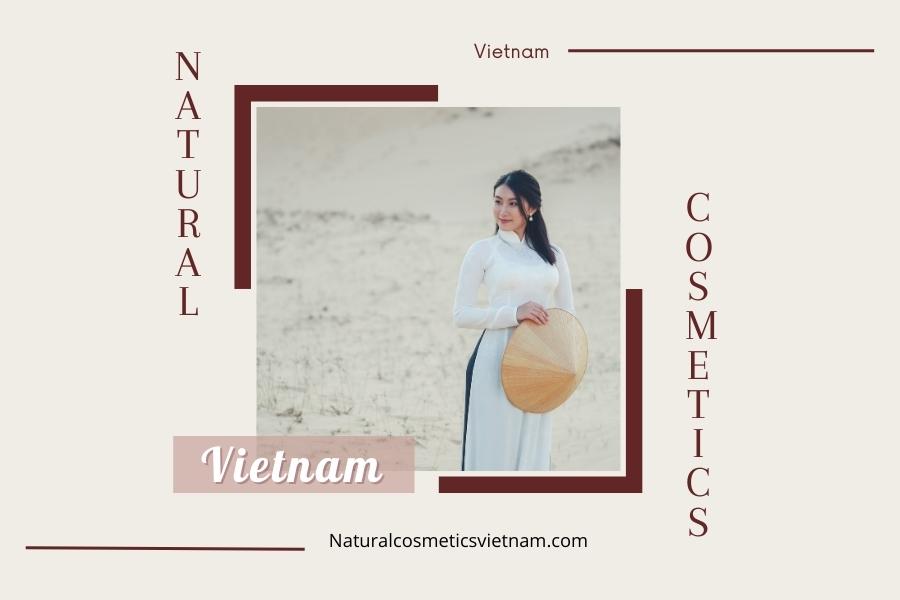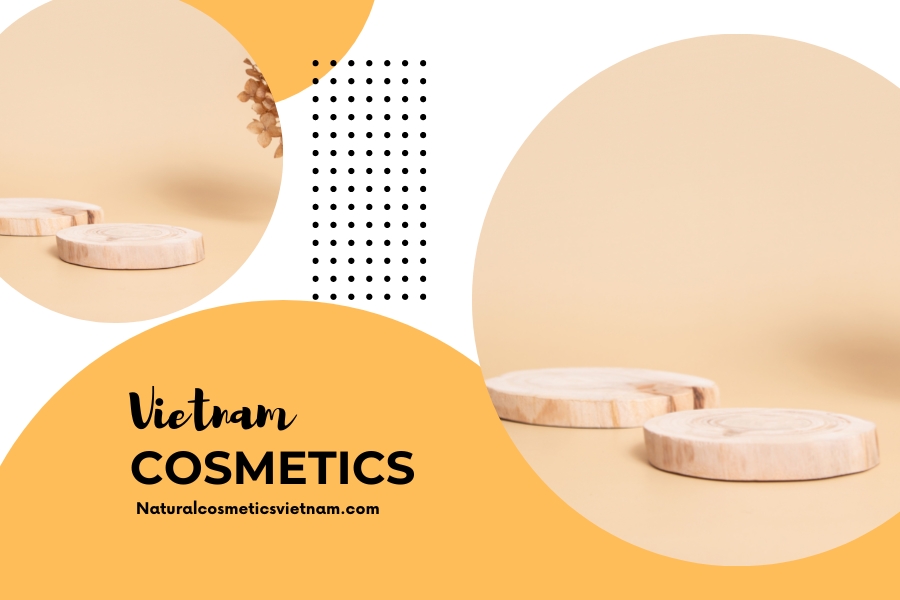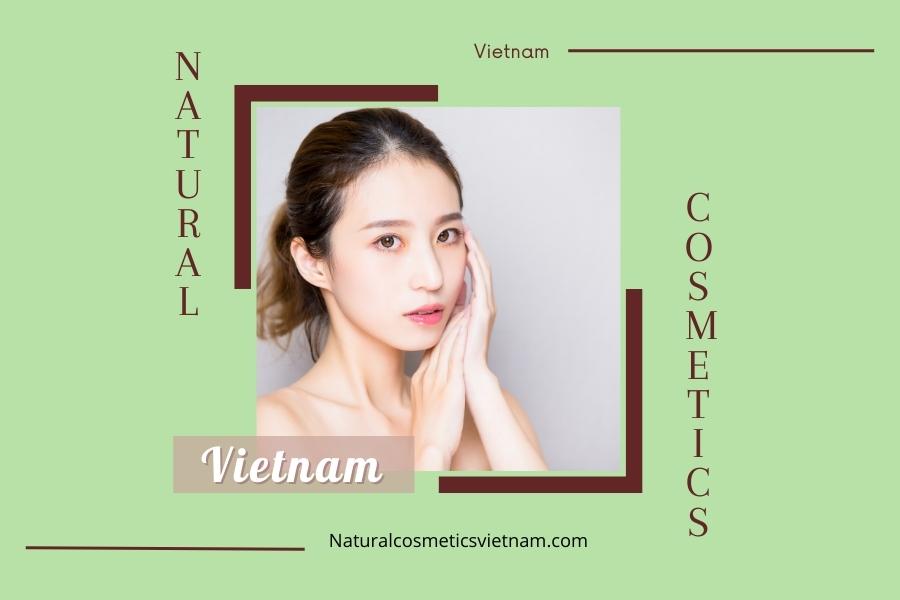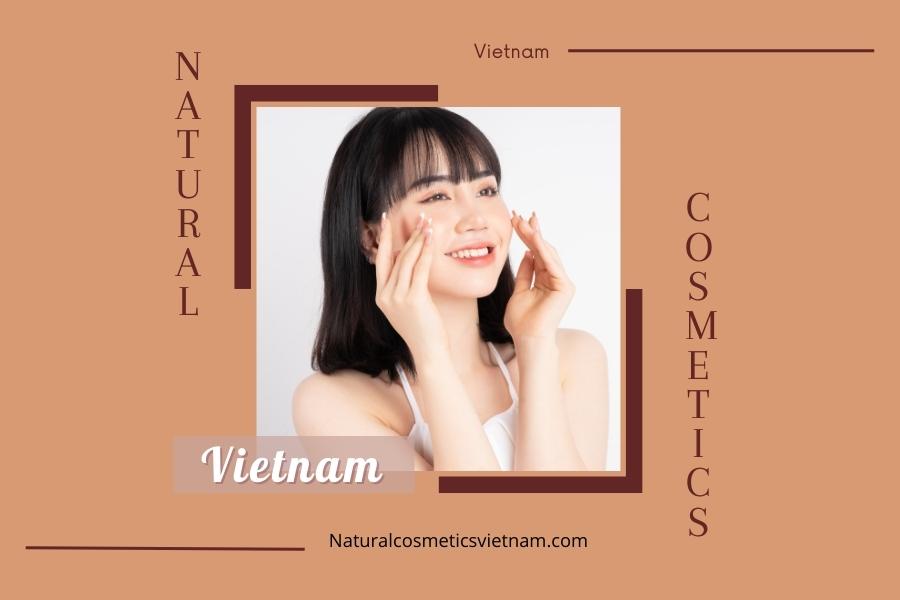Natural skin care products are becoming increasingly popular as more people become aware of the potential harm that synthetic chemicals can cause to our skin and the environment. These products are typically free from chemicals and synthetic ingredients and may also include more environmentally friendly options.
The natural skin care industry is one of the fastest-growing markets in the beauty industry, with an increasing number of consumers opting for natural and organic products. According to a report by Grand View Research, the global natural and organic skincare market size was valued at USD 7.03 billion in 2020 and is expected to grow at a CAGR of 5.9% from 2021 to 2028.

Natural Cosmetics: Everything You Need to Know About Starting a Natural Skincare Routine

Natural Cosmetics: Everything You Need to Know About Starting a Natural Skincare Routine
One of the main reasons to use natural skin care products instead of traditional ones is to avoid potentially harmful synthetic chemicals. Synthetic chemicals such as parabens, phthalates, and sulfates are commonly found in traditional skincare products and have been linked to various health concerns such as allergies, hormone disruption, and even cancer. On the other hand, natural skin care products are made from plant-based ingredients and are typically safer and gentler on the skin.
Using natural skin care products can also be an eco-friendly option. Traditional skincare products often come in plastic packaging that contributes to environmental pollution, whereas natural products often use more sustainable and biodegradable materials such as glass or paper. Additionally, natural skincare products may also use organic and sustainably sourced ingredients that have a lower environmental impact.
So, how can you get started with your own natural skin care routine? Firstly, it’s important to consider your skin type and any specific skin concerns you may have. Natural skincare products often use a range of plant-based ingredients that cater to different skin types and needs, so it’s essential to choose products that are tailored to your individual skin concerns.
Another factor to consider when building your natural skincare routine is the frequency of use. While some products may be used daily, such as cleansers and moisturizers, others may only need to be used once or twice a week, such as exfoliants or masks.
When trying out natural skincare products, it’s important to be patient and allow time for the products to work. Unlike traditional products that may contain harsh chemicals that provide immediate results, natural products may take longer to show visible improvements in the skin.
At the end of the day, beauty is a personal journey, and there is no one-size-fits-all approach to skincare. That’s why it’s essential to rely on a diverse group of experts to share their tips and recommendations. Whether it’s a tried-and-true skincare regimen, hair care routine, or the latest cosmetics, it’s important to find products that work best for you.
At our platform, we take pride in recommending only products that we genuinely love and that have been thoroughly researched by our team. So, if you see a shop link to a specific product or brand, rest assured that it’s a high-quality product that has been rigorously tested and recommended by our team of experts.
What is natural skin care?

Natural Cosmetics: Everything You Need to Know About Starting a Natural Skincare Routine
The term “natural skin care” is becoming increasingly popular in the beauty industry, with many consumers opting for products that are free from synthetic chemicals and made from plant-based ingredients. However, the term “natural” is not regulated across the industry, and each company can choose what “natural” means for themselves. This can lead to confusion and inconsistency in the products labeled as “natural.”
According to licensed aesthetician and beauty blog author Dana Murray, there is a lot of debate in the industry about what constitutes “natural” and what does not. Natural ingredients can be inconsistent in makeup, making it challenging to measure their effectiveness and potency. Additionally, some natural ingredients, such as essential oils, can cause skin irritation.
Despite these challenges, natural skin care products offer several benefits over their synthetic counterparts. According to a 2015 clinical review of plant extracts in skin care, botanical products can be a rich source of vitamins, antioxidants, essential oils, hydrocolloids, proteins, terpenoids, and bioactive compounds. These natural ingredients can provide numerous benefits to the skin, such as improving skin hydration, reducing inflammation, and protecting against environmental stressors.
Plant extracts may also be a safe and cost-effective alternative to synthetic chemicals. Synthetic chemicals, such as parabens and phthalates, have been linked to various health concerns, including allergies, hormone disruption, and even cancer. Natural skin care products, on the other hand, are typically safer and gentler on the skin.
When it comes to choosing natural skin care products, it’s essential to consider your skin type and any specific skin concerns you may have. Different natural ingredients can cater to different skin types and needs, so it’s important to choose products that are tailored to your individual skin concerns.
For example, if you have oily or acne-prone skin, you may benefit from products containing tea tree oil or witch hazel, which can help reduce inflammation and control excess oil production. If you have dry or sensitive skin, you may benefit from products containing aloe vera or chamomile, which can help soothe and hydrate the skin.
In conclusion, natural skin care products offer numerous benefits over synthetic ones. While the term “natural” is not regulated across the industry, and some natural ingredients can cause skin irritation, plant extracts can be a safe and cost-effective alternative to synthetic chemicals. When choosing natural skin care products, it’s essential to consider your skin type and individual skin concerns to find products that work best for you.

Natural Cosmetics: Everything You Need to Know About Starting a Natural Skincare Routine
For oily skin
For individuals with oily skin, finding the right skin care routine can be a challenge. Excessive oil production can lead to breakouts, enlarged pores, and a shiny complexion. However, a natural skin care routine for oily skin can help reduce oiliness without the use of expensive skin care regimens or prescription drugs.
There are several methods of using natural skin care and home remedies for oily skin. These methods include:
- Cleansing with oil: Cleansing oily skin with oil may seem counterintuitive, but it can actually help to balance the skin’s natural oil production. Using natural oils such as jojoba, grapeseed, or almond oil can help dissolve excess oil, dirt, and makeup without stripping the skin of its natural oils.
- Exfoliation with natural ingredients: Exfoliation is an essential step in any skin care routine, but using harsh scrubs can irritate oily skin and cause more oil production. Instead, try using natural ingredients such as ground oats, honey, or sugar to gently exfoliate the skin and remove dead skin cells.
- Clay masks: Clay masks are a popular natural remedy for oily skin. Bentonite clay, in particular, is known for its ability to absorb excess oil and impurities from the skin. Mix the clay with water or apple cider vinegar to create a paste, apply to the skin, and leave on for 10-15 minutes before rinsing off.
- Witch hazel: Witch hazel is a natural astringent that can help to reduce oiliness and tighten pores. Apply witch hazel to the skin with a cotton ball after cleansing or use it as a toner in your skin care routine.
- Tea tree oil: Tea tree oil has antibacterial properties that can help to fight acne and reduce oiliness. Mix a few drops of tea tree oil with a carrier oil such as jojoba or grapeseed oil and apply to the skin as a spot treatment.
In addition to these natural remedies, it’s important to follow a few basic skin care tips to keep oily skin under control. These tips include:
- Wash your face twice a day with a gentle cleanser.
- Use oil-free and non-comedogenic products to avoid clogging pores.
- Avoid touching your face with your hands, as this can transfer oil and bacteria to the skin.
- Drink plenty of water to help flush toxins from the body and keep the skin hydrated.
In conclusion, a natural skin care routine for oily skin can help to reduce oiliness and improve the overall health of the skin. By incorporating natural remedies such as oil cleansing, clay masks, and witch hazel, as well as following basic skin care tips, individuals with oily skin can achieve a healthier, more balanced complexion without the use of harsh chemicals or prescription drugs.

Natural Cosmetics: Everything You Need to Know About Starting a Natural Skincare Routine
For dry skin
Dry skin can be a frustrating and uncomfortable condition to deal with. It can cause itchiness, flakiness, and discomfort. However, a natural skin care routine for dry skin can help reduce the effects of heat, hot showers, arid climates, and harsh soaps, all of which can trigger dry skin.
Here are some tips for creating a natural skin care routine for dry skin:
- Use a gentle cleanser: Harsh soaps and cleansers can strip the skin of its natural oils, exacerbating dryness. Instead, choose a gentle, pH-balanced cleanser that is specifically formulated for dry skin.
- Exfoliate gently: Exfoliating can help to remove dead skin cells and improve the texture of dry skin, but it’s important to do so gently to avoid further irritation. Try using a gentle exfoliant, such as a sugar scrub, no more than once a week.
- Moisturize regularly: Moisturizing is essential for dry skin, as it helps to restore the skin’s natural moisture barrier. Look for a moisturizer that is rich in emollients and humectants, such as shea butter, glycerin, or hyaluronic acid. Apply moisturizer to damp skin after showering or bathing to lock in moisture.
- Use natural oils: Natural oils, such as jojoba oil, avocado oil, and coconut oil, can help to nourish and hydrate dry skin. Apply a few drops of oil to the skin after cleansing and before moisturizing for added hydration.
- Avoid hot showers and baths: Hot water can strip the skin of its natural oils, causing further dryness. Instead, try taking lukewarm showers or baths and avoid staying in the water for extended periods of time.
- Use a humidifier: Dry air can exacerbate dry skin, especially during the winter months. Using a humidifier can help to add moisture back into the air and prevent dryness.
In addition to these natural remedies, it’s important to stay hydrated by drinking plenty of water and eating a healthy diet rich in fruits, vegetables, and omega-3 fatty acids.
In conclusion, a natural skin care routine for dry skin can help to reduce the discomfort and itchiness associated with dryness. By using gentle cleansers, moisturizing regularly, and incorporating natural oils and humidifiers, individuals with dry skin can improve the health and appearance of their skin without the use of harsh chemicals or prescription drugs.

Natural Cosmetics: Everything You Need to Know About Starting a Natural Skincare Routine
For combination skin
Dry skin can be a frustrating and uncomfortable condition to deal with. It can cause itchiness, flakiness, and discomfort. However, a natural skin care routine for dry skin can help reduce the effects of heat, hot showers, arid climates, and harsh soaps, all of which can trigger dry skin.
Here are some tips for creating a natural skin care routine for dry skin:
- Use a gentle cleanser: Harsh soaps and cleansers can strip the skin of its natural oils, exacerbating dryness. Instead, choose a gentle, pH-balanced cleanser that is specifically formulated for dry skin.
- Exfoliate gently: Exfoliating can help to remove dead skin cells and improve the texture of dry skin, but it’s important to do so gently to avoid further irritation. Try using a gentle exfoliant, such as a sugar scrub, no more than once a week.
- Moisturize regularly: Moisturizing is essential for dry skin, as it helps to restore the skin’s natural moisture barrier. Look for a moisturizer that is rich in emollients and humectants, such as shea butter, glycerin, or hyaluronic acid. Apply moisturizer to damp skin after showering or bathing to lock in moisture.
- Use natural oils: Natural oils, such as jojoba oil, avocado oil, and coconut oil, can help to nourish and hydrate dry skin. Apply a few drops of oil to the skin after cleansing and before moisturizing for added hydration.
- Avoid hot showers and baths: Hot water can strip the skin of its natural oils, causing further dryness. Instead, try taking lukewarm showers or baths and avoid staying in the water for extended periods of time.
- Use a humidifier: Dry air can exacerbate dry skin, especially during the winter months. Using a humidifier can help to add moisture back into the air and prevent dryness.
In addition to these natural remedies, it’s important to stay hydrated by drinking plenty of water and eating a healthy diet rich in fruits, vegetables, and omega-3 fatty acids.
In conclusion, a natural skin care routine for dry skin can help to reduce the discomfort and itchiness associated with dryness. By using gentle cleansers, moisturizing regularly, and incorporating natural oils and humidifiers, individuals with dry skin can improve the health and appearance of their skin without the use of harsh chemicals or prescription drugs.

Natural Cosmetics: Everything You Need to Know About Starting a Natural Skincare Routine
For acne-prone skin
Acne-prone skin can be a challenging condition to deal with, and many individuals turn to expensive acne solutions to manage their symptoms. However, a natural skin care routine for acne may offer many benefits, including potentially saving money and avoiding undesirable side effects such as dryness, redness, and irritation.
Here are some tips for creating a natural skin care routine for acne-prone skin:
- Cleansing with natural ingredients: Harsh cleansers can strip the skin of its natural oils, leading to further acne and irritation. Instead, try using natural ingredients such as honey, tea tree oil, or aloe vera to cleanse the skin gently.
- Exfoliation with gentle scrubs: Exfoliating can help to remove dead skin cells and unclog pores, but harsh scrubs can further irritate acne-prone skin. Try using gentle scrubs with natural ingredients such as ground oats, sugar, or coffee grounds.
- Use natural oils: Natural oils such as tea tree oil, jojoba oil, and rosehip oil can help to soothe acne-prone skin and reduce inflammation. Apply a few drops of oil to the skin after cleansing and before moisturizing for added hydration.
- Clay masks: Clay masks can help to absorb excess oil and unclog pores, making them a popular natural remedy for acne-prone skin. Bentonite clay, in particular, is known for its ability to absorb toxins and impurities from the skin.
- Avoid irritating ingredients: Avoid skincare products that contain irritating ingredients such as alcohol, fragrances, and sulfates, as these can further irritate acne-prone skin.
In addition to these natural remedies, it’s important to maintain a healthy lifestyle to help prevent acne. This includes eating a balanced diet, getting enough sleep, managing stress levels, and avoiding touching the face with dirty hands.
It’s important to note that natural remedies may not work for everyone, and it’s essential to consult with a dermatologist if you have severe acne or if natural remedies do not provide relief.
In conclusion, a natural skin care routine for acne-prone skin can help to manage symptoms without the use of harsh chemicals or prescription drugs. By using natural ingredients, avoiding irritating products, and maintaining a healthy lifestyle, individuals with acne-prone skin can achieve clearer, healthier-looking skin.

Natural Cosmetics: Everything You Need to Know About Starting a Natural Skincare Routine
For sensitive skin
Sensitive skin requires special attention when it comes to skin care, as it can be easily irritated by harsh chemicals and fragrances. A natural skin care routine for sensitive skin may help rebuild a healthy skin barrier by avoiding products with irritating ingredients. This can help reduce inflammation, redness, and discomfort associated with sensitive skin.
A 2018 study examined the risk of skin sensitivity associated with products containing fragrances. It found that fragrances in skin care products can increase the risk of skin irritation, especially in products that are worn for an extended period of time, such as moisturizers. Therefore, individuals with sensitive skin should avoid using products with added fragrances and opt for natural, fragrance-free options instead.
For individuals with darker skin tones, specific skin conditions may require extra care and attention. Darker skin tones contain more melanin, which is the naturally occurring pigment that gives skin and hair its color. Conditions that can adversely affect skin with more pigment include acne, acne keloidalis nuchae (bumps on the back of the head or neck), keloids (raised scars on the skin), skin cancer, and vitiligo (a loss of skin pigment that may be more visible in darker skin tones).
While natural skin care products may potentially benefit acne, it’s important to consult a dermatologist for a correct diagnosis and treatment plan for other skin conditions, such as cancer or vitiligo.
In conclusion, a natural skin care routine for sensitive skin can help reduce the risk of skin irritation and rebuild a healthy skin barrier. This includes avoiding products with fragrances, using gentle cleansers and moisturizers, and incorporating natural ingredients such as aloe vera and chamomile. Individuals with darker skin tones should also be aware of specific skin conditions that may require extra care and attention and seek medical advice when necessary.

Natural Cosmetics: Everything You Need to Know About Starting a Natural Skincare Routine
Terms to know
The term “natural” can mean different things to different people, and without strict definitions in the industry, it can be difficult to know which products are truly natural. However, there are a few terms to know when deciding on a new natural skin care product.
- Organic: Products that are labeled organic must meet strict standards set by the United States Department of Agriculture (USDA). These standards require that the product be made with at least 95% organic ingredients, and any remaining ingredients must be on a list of approved substances.
- Clean: Clean beauty refers to products that are free from potentially harmful ingredients such as parabens, phthalates, and sulfates. However, there is no standardized definition for clean beauty, so it’s important to read ingredient labels carefully.
- Cruelty-free: Cruelty-free products are not tested on animals. Look for products with a cruelty-free certification from organizations such as Leaping Bunny or PETA.
- Vegan: Vegan products do not contain any animal-derived ingredients. Look for products with a vegan certification or ingredients such as plant-based oils and butters.
- Non-toxic: Non-toxic products are free from harmful chemicals such as formaldehyde, lead, and mercury. However, like clean beauty, there is no standardized definition for non-toxic.
When deciding on a new natural skin care product, it’s important to read ingredient labels carefully and do research on the company’s practices and certifications. Look for products that are certified organic, cruelty-free, and/or vegan, and avoid products with potentially harmful ingredients.

Natural Cosmetics: Everything You Need to Know About Starting a Natural Skincare Routine
In addition to these terms, it’s important to consider your own skin type and specific skin care needs when choosing natural skin care products. What works for one person may not work for another, so it’s important to do your research and find products that work best for your individual needs.
In conclusion, understanding the terms used in the natural skin care industry can help you make informed decisions when choosing products. Look for products with certifications such as organic, cruelty-free, and vegan, and avoid products with potentially harmful ingredients. Remember to also consider your own skin type and specific needs when choosing natural skin care products.
When choosing a natural skin care product, it’s important to ask yourself the question: what is the product derived from? Understanding the origin of the ingredients can help you make informed decisions about the products you use on your skin.
There are three main categories of ingredients: naturally-occurring, nature-identical, and synthetic.
- Naturally-occurring: Ingredients in these products are used in their natural, unprocessed state. They are derived from natural sources such as plants, animals, minerals, and marine sources. Examples of naturally-occurring ingredients include raw honey and crushed flowers. These ingredients are often preferred by those who want to use natural, minimally processed products on their skin.
- Nature-identical: Ingredients in nature-identical products are produced in a lab and are chemically identical to those that occur in nature. An example is sorbic acid, which was originally derived from rowan berries but is now commonly included as a nature-identical ingredient. Nature-identical ingredients can offer benefits such as consistency and stability while still being derived from natural sources.
- Synthetic: This term sits on the far end of the spectrum and includes ingredients that were created and processed in a lab. Synthetic ingredients are often cheaper and more consistent than naturally-occurring or nature-identical ingredients. However, they can also be less environmentally friendly and may not offer the same benefits as natural ingredients. An example of a synthetic ingredient is parabens, which are common preservatives found in cosmetics and skin care products.
When choosing a natural skin care product, it’s important to read ingredient labels carefully and look for products that use natural and nature-identical ingredients. While synthetic ingredients may be cheaper and more consistent, they may not offer the same benefits as natural ingredients and can be less environmentally friendly.
In conclusion, understanding the origin of the ingredients in natural skin care products can help you make informed decisions about the products you use on your skin. Look for products that use natural and nature-identical ingredients and read ingredient labels carefully to avoid synthetic ingredients that may be less beneficial for your skin and the environment.

Natural Cosmetics: What is the difference between natural and organic cosmetics?
How is it processed?
When choosing natural skin care products, it’s important to consider not only the origin of the ingredients but also how they are processed. Ingredients can be processed physically or chemically, and the processing method can affect their properties and benefits.
- Processed physically: This means that the molecular composition or structure of the ingredient remains the same during processing. Examples of naturally derived but physically processed ingredients include raw, unrefined oils and butters. These ingredients are processed through methods such as cold-pressing or filtration, which help retain their natural properties and benefits.
- Processed chemically: This means that the molecular composition or structure of the ingredient changes during processing. An example of a naturally derived but chemically processed ingredient is castor wax. It’s a vegetable wax derived from the castor bean, and it’s produced by adding hydrogen to pure castor oil, a process called hydrogenation. While this process changes the molecular structure of the ingredient, it can also improve its stability and texture.
When choosing natural skin care products, it’s important to look for products that use ingredients that are minimally processed or processed in a way that preserves their natural properties. Raw, unrefined oils and butters are a great option, as they are often processed through gentle methods that retain their natural benefits. It’s also important to be aware of chemically processed ingredients and their potential effects on the skin.
In conclusion, understanding how natural skin care ingredients are processed can help you make informed decisions when choosing products. Look for products that use minimally processed or gently processed ingredients and avoid products that use chemically processed ingredients that may be less beneficial for your skin. By choosing natural skin care products that are minimally processed, you can help ensure that your skin receives the full benefits of natural ingredients.

Natural Cosmetics: Everything You Need to Know About Starting a Natural Skincare Routine
Know your labels
When choosing natural skin care products, it’s important to be aware of various certifications and marketing words that are used in the industry. Some of these labels are regulated, while others are not, and it’s important to understand what they mean in order to make informed decisions about the products you use on your skin.
Organic
When choosing natural skin care products, it’s important to be aware of various certifications and marketing words that are used in the industry. Some of these labels are regulated, while others are not, and it’s important to understand what they mean in order to make informed decisions about the products you use on your skin.
One label to look for is “organic”. Companies can have their products certified organic by meeting strict standards set by the United States Department of Agriculture (USDA). These standards require that the product be made with at least 95% organic ingredients, and any remaining ingredients must be on a list of approved substances. Look for products that have the USDA organic certification on the label, which indicates that the product has been certified as organic.
Some companies may also use the word “organic” on their labels to indicate that all the ingredients are derived from organic sources. While the product itself may not be certified organic, this can still be a good indication that the product contains natural, minimally processed ingredients.
Another label to look for is “cruelty-free”. This means that the product and its ingredients have not been tested on animals. Look for products that have a cruelty-free certification from organizations such as Leaping Bunny or PETA.
“Vegan” is another label to look for, which means that the product does not contain any animal-derived ingredients. Look for products with a vegan certification or ingredients such as plant-based oils and butters.
Finally, the term “clean beauty” is used to describe products that are free from potentially harmful ingredients such as parabens, phthalates, and sulfates. However, there is no standardized definition for clean beauty, so it’s important to read ingredient labels carefully and do your research on the company’s practices.
In conclusion, understanding the labels used in the natural skin care industry can help you make informed decisions when choosing products. Look for products that have certifications such as USDA organic, cruelty-free, and vegan, and avoid products with potentially harmful ingredients. Remember to also consider your own skin type and specific needs when choosing natural skin care products. By choosing products that are labeled with certifications and labels that align with your values, you can ensure that you’re using natural skin care products that are safe, effective, and environmentally friendly.

Natural Cosmetics: Everything You Need to Know About Starting a Natural Skincare Routine
Green
When it comes to natural skin care products, the term “green” is often used to refer to environmental impact and sustainability. However, it’s important to understand that this term is unregulated, which means that different brands may use it to mean different things.
In general, green products are produced with the intention of limiting environmental impact. This can include using raw materials that are harvested in a sustainable way, such as using renewable resources or supporting fair trade practices. Green products may also be produced using eco-friendly manufacturing processes, such as reducing waste or using renewable energy sources.
However, it’s important to note that the term “green” does not necessarily mean that a product is completely environmentally friendly or sustainable. Some companies may use the term as a marketing tactic without actually implementing sustainable practices in their manufacturing process.
To ensure that you’re choosing truly sustainable and environmentally friendly products, look for products that have certifications such as the Rainforest Alliance or Fairtrade International. These certifications ensure that the products have been produced using sustainable and fair practices.
It’s also important to consider the packaging of the products you’re using. Look for products that use eco-friendly packaging materials such as glass or recycled plastic, and try to avoid products with excessive packaging or single-use packaging.
In conclusion, the term “green” in the natural skin care industry refers to environmental impact and sustainability. While this term is unregulated, it can still be a useful indicator of a product’s commitment to sustainability. Look for products with certifications and eco-friendly packaging, and do your research on the company’s sustainable practices to ensure that you’re making an environmentally conscious choice when choosing natural skin care products
Clean
The term “clean” is often used in the natural skin care industry to describe products that focus on being nontoxic. However, it’s important to note that this term is unregulated, which means that different brands may use it to mean different things.
In general, clean products are formulated without potentially harmful ingredients such as parabens, phthalates, and sulfates. They may also be free from synthetic fragrances, dyes, and other additives that can be irritating to the skin. Clean products often use natural and organic ingredients, and they may be produced using eco-friendly manufacturing processes.
While the term “clean” can be a useful indicator of a product’s commitment to using safe and natural ingredients, it’s important to remember that it is not regulated by the government. This means that different brands may use the term to mean different things, and there is no standardized definition for what makes a product “clean”.
To ensure that you’re choosing products that are truly nontoxic, it’s important to read ingredient labels carefully and do your research on the brand’s practices. Look for products that have certifications such as the USDA organic certification, which requires products to be made with at least 95% organic ingredients. You can also look for products that have been certified by organizations such as the Environmental Working Group (EWG), which rates products based on their potential health hazards.
In conclusion, the term “clean” in the natural skin care industry refers to products that focus on being nontoxic and free from potentially harmful ingredients. While this term can be a useful indicator of a product’s commitment to natural and safe ingredients, it is not regulated by the government, which means that different brands may use it to mean different things. To ensure that you’re choosing truly nontoxic products, read ingredient labels carefully and do your research on the brand’s practices.
Vegan
These products are created without animal by-products.

Natural Cosmetics: Everything You Need to Know About Starting a Natural Skincare Routine
Cruelty-free
When it comes to natural skin care products, the term “cruelty-free” is often used to indicate that the finished product has not been tested on animals. However, it’s important to note that individual ingredients may still have been tested on animals. In addition, while vegan products are almost always cruelty-free, cruelty-free products are not always vegan.
It’s important to be aware that there is currently no regulation for terms such as “cruelty-free” and “vegan” in the natural skin care industry. This means that brands can claim these terms without being certified. However, several organizations do certify vegan and cruelty-free products, including Leaping Bunny, PETA, and Choose Cruelty Free.
When choosing natural skin care products, look for products that have been certified by one of these organizations. This ensures that the product has been thoroughly vetted and meets strict standards for animal testing.
It’s also important to be aware that some ingredients in natural skin care products may still be derived from animals. For example, beeswax and lanolin are commonly used in natural skin care products. While these ingredients may be derived from animals, they can still be considered cruelty-free if they are harvested in a sustainable and ethical manner.
In conclusion, the term “cruelty-free” in the natural skin care industry refers to products that have not been tested on animals. While there is no regulation for this term, several organizations certify vegan and cruelty-free products. Look for products that have been certified by these organizations, and be aware that some ingredients may still be derived from animals. By choosing products that are certified as cruelty-free, you can ensure that you’re making an ethical and compassionate choice when it comes to your natural skin care routine.
Fair-trade
This regulated descriptor focuses on sourcing, ensuring that ingredients are sourced ethically in terms of the planet, people, or environment.
Best natural skin care routine for your 30s and beyond
As we enter our 30s and beyond, our skin undergoes changes that require adjustments to our skin care routine. Hormone levels begin to decrease, and the rate of collagen and elastin production slows down, leading to changes in skin texture, tone, and elasticity. To address these changes, it’s important to establish a natural skin care routine that works for your specific skin type and concerns.
Here’s a general natural skin care routine that may work for most people in their 30s and beyond:
- Cleanser: Start your routine by cleansing your skin with a gentle, natural cleanser that is formulated for your skin type. Look for ingredients like aloe vera, chamomile, or green tea to soothe and calm the skin.
- Toner: After cleansing, use a natural toner to remove any remaining dirt, oil, or makeup from your skin. Toners can also help balance the skin’s pH and prepare it for the next steps in your routine.
- Serum: Next, apply a natural serum that is rich in antioxidants and other skin-loving ingredients. Look for serums that contain vitamin C, vitamin E, or hyaluronic acid to help boost collagen production and hydrate the skin.
- Eye cream: As we age, the skin around our eyes becomes thinner and more delicate, leading to fine lines and wrinkles. Use a natural eye cream that is formulated specifically for the eye area to help reduce the appearance of fine lines and dark circles.
- Moisturizer: Finish your routine with a natural moisturizer that is formulated for your skin type. Look for ingredients like shea butter, jojoba oil, or argan oil to help hydrate and nourish the skin.
In addition to this basic routine, there are other natural skin care practices that can help keep your skin healthy and youthful. These include:
- Exfoliating once or twice a week to remove dead skin cells and promote cell turnover
- Using a natural sunscreen with at least SPF 30 to protect your skin from sun damage
- Drinking plenty of water to keep your skin hydrated from the inside out
- Eating a healthy diet that is rich in fruits, vegetables, and other nutrient-dense foods
- Getting enough sleep and managing stress levels to promote overall health and well-being
In conclusion, establishing a natural skin care routine that works for your specific skin type and concerns is key to maintaining healthy, youthful-looking skin in your 30s and beyond. Use natural products that are formulated with skin-loving ingredients, and incorporate other healthy habits like exfoliating, using sunscreen, and eating a healthy diet to support your skin’s health and vitality.

Natural Cosmetics: Everything You Need to Know About Starting a Natural Skincare Routine
Morning
1. Cleansing
Starting your day with a gentle cleansing is an essential part of a natural skin care routine. Cleansing removes dirt, oil, and impurities from your skin, helping to prevent breakouts and promote a healthy, glowing complexion.
When choosing a cleanser for your morning routine, look for a natural product that is formulated with skin-nourishing vitamins, such as vitamin A, vitamin B2, vitamin B12, and vitamin E. These vitamins can help to hydrate, nourish, and protect your skin.
To cleanse your skin, wet your face with lukewarm water, then apply a small amount of cleanser to your fingertips. Gently massage the cleanser into your skin in circular motions, taking care to avoid the delicate skin around your eyes. Rinse your face with lukewarm water and pat dry with a soft towel.
Toning
After cleansing, use a natural toner to help balance your skin’s pH and prepare it for the next steps in your routine. Toners can also help to remove any remaining dirt or oil from your skin and can provide additional hydration.
Look for a natural toner that is formulated with skin-nourishing ingredients, such as rose water, witch hazel, or aloe vera. These ingredients can help to soothe and calm your skin, reduce inflammation, and provide additional hydration.
To use a toner, apply a small amount to a cotton pad and gently swipe it over your face and neck. Allow the toner to absorb into your skin before moving on to the next step in your routine.
Moisturizing
Moisturizing is an essential step in any natural skin care routine. It helps to hydrate and nourish your skin, preventing dryness, flakiness, and other signs of dehydration.
Look for a natural moisturizer that is formulated for your skin type and contains skin-nourishing ingredients, such as shea butter, jojoba oil, or argan oil. These ingredients can help to hydrate, nourish, and protect your skin, leaving it soft, smooth, and supple.
To use a moisturizer, apply a small amount to your fingertips and gently massage it into your skin in circular motions. Pay special attention to any areas that are prone to dryness, such as your cheeks, forehead, and chin.
Sunscreen
Finally, protect your skin from the damaging effects of the sun by applying a natural sunscreen with at least SPF 30. Look for a product that is formulated with zinc oxide or titanium dioxide, which are natural, mineral-based sunscreens that provide broad-spectrum protection.
To use a sunscreen, apply a small amount to your face and neck, taking care to avoid the delicate skin around your eyes. Reapply throughout the day as needed, especially if you are spending time outdoors.
In conclusion, a morning natural skin care routine should consist of cleansing, toning, moisturizing, and applying sunscreen. Use natural products that are formulated with skin-nourishing ingredients, and take care to protect your skin from the damaging effects of the sun. With consistent care, you can achieve a healthy, radiant complexion that lasts all day long.
2. Exfoliating
Exfoliation is an important step in any natural skin care routine, as it helps to remove dead skin cells and promote cell turnover, leaving your skin looking brighter and more radiant. However, it’s important to use exfoliants in moderation, as over-exfoliation can cause irritation, redness, and dryness.
Ideally, you should use an exfoliant 1 to 3 times per week, depending on your skin type and the product you’re using. Look for a natural exfoliant that is gentle on your skin and free of harsh chemicals or abrasive ingredients.
To use an exfoliant, wet your face with lukewarm water, then apply a small amount to your fingertips. Gently massage the exfoliant into your skin in circular motions for about 30 seconds, taking care to avoid the delicate skin around your eyes. Rinse your face with lukewarm water and pat dry with a soft towel.
It’s important to avoid over-exfoliation, as this can damage your skin and cause irritation. If you notice any redness or dryness after using an exfoliant, reduce the frequency of use or switch to a gentler product.
On the days when you aren’t exfoliating, simply skip this step and move on to your regular cleansing and moisturizing routine. By using exfoliants in moderation and choosing natural, gentle products, you can achieve a healthy, glowing complexion without causing damage to your skin.
3. Toning
Toning is an important step in any natural skin care routine, yet it’s often overlooked. Toners can help tighten pores, eliminate impurities, and rebalance your skin’s pH levels, making it an essential step for maintaining healthy, radiant skin.
When selecting a toner, look for natural ingredients that are gentle on your skin and free of harsh chemicals. Grape seed extract and peach extract are both great natural options that can help clarify your skin and restore its natural balance.
Another option to consider is incorporating antioxidants like vitamin E and ginseng powder into your skin care routine. These powerful ingredients have been shown to help fight hyperpigmentation, including melasma, a common skin condition that causes dark patches on the face.
To use a toner, simply apply a small amount to a cotton pad and gently sweep it over your face, taking care to avoid the delicate skin around your eyes. Allow the toner to dry completely before moving on to the next step in your routine.
In addition to toning, it’s important to incorporate other natural skin care products and practices into your routine to achieve optimal results. These may include using natural cleansers, moisturizers, and sunscreens, as well as practicing healthy lifestyle habits like staying hydrated, getting enough sleep, and eating a balanced diet.
By taking a holistic approach to your skin care routine and choosing natural, gentle products, you can achieve healthy, radiant skin that looks and feels its best.

Natural Cosmetics: Everything You Need to Know About Starting a Natural Skincare Routine
4. Moisturizing
Moisturizing is an essential step in any natural skin care routine, as it helps to hydrate and protect your skin, leaving it looking and feeling soft, smooth, and radiant. When selecting a moisturizer, look for natural ingredients that are gentle on your skin and free of harsh chemicals or artificial fragrances.
Ceramides are a key ingredient to look for in moisturizers, as they help to hydrate and protect your skin’s natural barrier. Specifically, look for phytoceramides, which are plant-derived ceramides that help to hold in moisture and keep your skin hydrated and healthy.
Jojoba oil is another great moisturizing ingredient that can help to boost rejuvenation and protect against environmental stressors. It has potential anti-inflammatory, antifungal, and antioxidant properties, making it a great choice for those with sensitive or acne-prone skin.
Serums are another great way to deliver active ingredients deep into your skin’s dermal layers. They typically contain a higher concentration of active ingredients than moisturizers, making them a great choice for targeting specific skin concerns like fine lines, wrinkles, and hyperpigmentation.
To use a serum, simply apply a few drops to your cheeks, chin, nose, and forehead, then gently massage the serum into your skin using upward, circular motions. Allow the serum to absorb completely before applying your moisturizer.
By incorporating natural moisturizers and serums into your skin care routine, you can help to hydrate and protect your skin, leaving it looking and feeling its best.
5. Sun protection
Sun protection is an essential step in any natural skin care routine, as exposure to the sun’s harmful UV rays can cause premature aging, sunburn, and even skin cancer. To protect your skin from the sun’s harmful rays, it’s important to use a broad-spectrum sunscreen with an SPF of at least 30.
When selecting a sunscreen, look for natural, mineral-based options that are free of harsh chemicals and synthetic fragrances. Mineral sunscreens use active ingredients like zinc oxide and titanium dioxide to reflect the sun’s rays, making them a safer and more eco-friendly choice for both your skin and the environment.
Dermatologists tend to recommend mineral sunscreens for those with sensitive skin, as they are less likely to cause irritation or allergic reactions. While mineral sunscreens can leave a white cast on the skin, which can be more noticeable on darker skin tones, tinted options may help to blend more seamlessly with your natural skin tone.
It’s important to apply sunscreen liberally and evenly to all exposed skin, including your face, neck, chest, and hands. Be sure to reapply sunscreen every two hours, or more frequently if you’re swimming or sweating.
Pro tip: When applying sunscreen, use the lightest fluids first. For example, start with a serum, then apply your moisturizer, and finish with your sunscreen. This will help to ensure that each product is fully absorbed into your skin and provides maximum protection throughout the day.
By incorporating a natural, mineral-based sunscreen into your daily skin care routine, you can help to protect your skin from the sun’s harmful rays and maintain a healthy, youthful complexion for years to come.

Natural Cosmetics: Everything You Need to Know About Starting a Natural Skincare Routine
Nighttime
Repeat the a.m. routine
If you’re looking to maintain healthy, glowing skin throughout the day, it’s important to establish a consistent morning skin care routine that you can repeat daily. This will help to nourish and protect your skin, while also setting the stage for a healthy complexion.
To begin your morning skin care routine, start by cleansing your face with a gentle, natural cleanser. This will help to remove any dirt, oil, or impurities that may have accumulated on your skin overnight, and prepare your skin for the rest of your routine.
Next, you may want to consider using an exfoliant to remove dead skin cells and promote cell turnover. However, be sure to use exfoliants only once or twice a week, as using them too frequently can cause irritation and dryness.
After exfoliating, apply a toner to your skin to help rebalance your pH levels and tighten your pores. Look for natural ingredients like grape seed extract or peach extract, which can help to clarify your skin and eliminate impurities.
Once your skin is toned, it’s time to moisturize. Look for a moisturizer that contains ceramides or phytoceramides, which will help to hydrate and protect your skin’s natural barrier. You may also want to consider using a serum to deliver active ingredients deep into your skin.
Finally, it’s important to protect your skin from the sun’s harmful UV rays by applying a broad-spectrum sunscreen with an SPF of at least 30. However, if you’re repeating your morning routine later in the day, you can skip this step, as you won’t be exposed to as much sunlight.
By establishing a consistent morning skin care routine that you can repeat each day, you can help to nourish and protect your skin, maintain a healthy complexion, and reduce your risk of premature aging and other skin damage.
Eye cream
Taking care of the delicate skin around your eyes is essential for maintaining a youthful appearance and preventing wrinkles. The skin in this area is thinner and more delicate than the rest of your face, making it more susceptible to damage and visible signs of aging.
That’s why using an eye cream as part of your daily skin care routine can be beneficial. Eye creams typically contain the same ingredients as regular moisturizers, but with fewer aggravating chemicals that can cause irritation and dryness.
When applying eye cream, it’s important to be gentle and take your time. Use your ring finger to apply the cream, as this finger is the weakest and will exert the least amount of pressure on your skin. Start at the inner corner of your eye and work your way outwards, using gentle tapping motions to help the cream absorb into your skin.
In addition to using eye cream, there are other steps you can take to protect the skin around your eyes and prevent wrinkles. For example, wearing sunglasses can help shield your eyes from the sun’s harmful UV rays, which can damage the delicate skin around your eyes and cause premature aging.
Getting enough sleep, staying hydrated, and eating a healthy diet can also help keep your skin looking youthful and radiant. And don’t forget to protect your skin from the sun’s harmful UV rays by applying a broad-spectrum sunscreen with an SPF of at least 30 to your face and neck every day.
By incorporating an eye cream into your daily skin care routine, and taking steps to protect the delicate skin around your eyes, you can help prevent wrinkles and maintain a youthful appearance for years to come.

Natural Cosmetics: Everything You Need to Know About Starting a Natural Skincare Routine
Night moisturizer
Night creams are specially formulated to provide intense hydration and nourishment to the skin while you sleep. They often contain ingredients like retinol, peptides, and antioxidants that can help boost collagen production, reduce the appearance of fine lines and wrinkles, and promote a more even skin tone.
Here are some tips for choosing a night moisturizer:
- Look for ingredients that are known to be effective for your skin concerns. For example, if you have dry skin, look for a moisturizer that contains hydrating ingredients like hyaluronic acid or glycerin. If you have mature skin, look for a cream that contains retinol or peptides to help boost collagen production.
- Choose a formula that is rich and emollient. Night creams are typically heavier than daytime moisturizers, and they should feel rich and luxurious on the skin. Look for creams that are formulated with nourishing oils and butters, like shea butter or avocado oil.
- Consider a cream with added benefits. Some night creams are formulated with additional ingredients that can help address specific skin concerns. For example, some creams contain niacinamide, which can help reduce the appearance of dark spots and hyperpigmentation, while others contain antioxidants to help protect the skin from environmental damage.
- Apply your cream correctly. To get the most benefit from your night moisturizer, apply it to clean, dry skin before bed. Use a gentle, upward motion to massage the cream into your skin, paying extra attention to any areas of concern. Allow the cream to absorb fully before getting into bed.
In addition to using a night cream, it’s also important to get plenty of restful sleep and maintain a healthy diet to support healthy skin. With a little extra care, you can wake up each morning with refreshed, rejuvenated skin.
Bonus steps
Taking care of your skin should be a daily priority. However, adding a few extra steps to your routine once or twice a week can give your skin the extra care it deserves. One such step is using a detox mask. Detox masks help draw out impurities and provide a deep cleanse to your skin.
Detox mask
There are many types of detox masks available in the market, but masks with charcoal or green tea leaves are two of the most popular options. Charcoal has the ability to draw out impurities and toxins from the skin due to its strong absorption properties. It can help unclog pores and remove excess oil from the skin. Green tea, on the other hand, is packed with antioxidants that can help protect the skin from environmental damage and signs of aging.
When using a detox mask, it’s important to follow the instructions carefully. Apply the mask evenly to your face and leave it on for the recommended time before rinsing it off with lukewarm water. Don’t leave the mask on for too long, as it can dry out your skin and cause irritation. Also, be sure to follow up with a moisturizer to hydrate your skin after the deep cleanse.
Facial oil
Facial oils are a great addition to your skincare routine, especially if you have dry or mature skin. They provide an extra layer of hydration and nourishment to your skin, helping to combat signs of aging and leave your skin feeling soft and supple.
Look for facial oils that are rich in antioxidants and essential fatty acids. Argan oil, for example, is packed with vitamin E and fatty acids that can help protect the skin from environmental damage and hydrate dry skin. Rosehip oil is another popular option, as it is rich in vitamin C and can help improve skin texture and reduce the appearance of scars and fine lines.
When using a facial oil, apply a few drops to your face after cleansing and toning. Gently massage the oil into your skin in circular motions, taking care to avoid the eye area. You can also mix a few drops of facial oil into your moisturizer for added hydration.
Sheet mask
Sheet masks are a popular trend in skincare and for good reason. They provide a quick and easy way to give your skin an extra boost of hydration and nourishment.
Sheet masks come in a variety of materials and are soaked in a serum that is rich in vitamins and antioxidants. They can help reduce the appearance of fine lines and wrinkles, brighten dull skin, and even out skin tone.
When using a sheet mask, apply it to your face and leave it on for the recommended time before removing it. Don’t rinse your face afterward, as the serum will continue to work its magic. Simply massage any excess serum into your skin and follow up with a moisturizer.
Incorporating these extra steps into your skincare routine can help give your skin the extra care it deserves. However, it’s important to remember that everyone’s skin is different, so it’s important to listen to your skin and adjust your routine accordingly. If you have any concerns, consult with a dermatologist to determine the best skincare routine for your skin type.
Bakuchiol Serum
Making your own natural skin care products at home can be a fun and cost-effective way to take care of your skin. However, it’s important to keep in mind that natural ingredients can still cause allergic reactions or irritation. It’s recommended to test any new homemade skin care products on a small area of skin before using them on your face or body.
Here are a few natural ingredients you can use to make your own skin care products at home:
Coconut oil
Coconut oil can be used as a moisturizer, makeup remover, and hair mask. It’s a rich source of fatty acids that can help improve skin hydration and protect the skin barrier. To use coconut oil as a moisturizer, simply apply a small amount to your face and body after showering.
Aloe vera
Aloe vera gel can be used as a soothing and hydrating face mask. It can also help reduce inflammation and redness. To make an aloe vera face mask, simply mix a small amount of aloe vera gel with honey and apply it to your face for 10-15 minutes before rinsing off.
Oatmeal
Oatmeal can be used as a gentle exfoliant and can help soothe dry, itchy skin. To make an oatmeal exfoliant, mix oatmeal with warm water to create a paste. Apply the paste to your face and gently massage in circular motions before rinsing off.
Honey
Honey is a natural humectant, which means it can help lock in moisture and hydrate the skin. It also has antibacterial properties that can help prevent acne. To use honey as a face mask, apply a thin layer of honey to your face and leave it on for 10-15 minutes before rinsing off.
Green tea
Green tea can help reduce inflammation and protect the skin against damage from UV radiation. To make a green tea toner, steep a green tea bag in hot water for a few minutes. Allow the tea to cool before applying it to your face with a cotton pad.
Lemon juice
Lemon juice can be used as a natural toner and can help reduce the appearance of dark spots and acne scars. However, it’s important to dilute lemon juice with water before applying it to your skin to avoid irritation. Mix equal parts lemon juice and water and apply it to your face with a cotton pad.
Overall, natural skin care products can offer many benefits, including avoiding potentially harmful synthetic chemicals and being eco-friendly. Whether you choose to make your own skin care products at home or purchase them from a store, it’s important to pay attention to the ingredients and consider your individual skin type and needs.

Natural Cosmetics: Everything You Need to Know About Starting a Natural Skincare Routine
Clarifying oatmeal mask
If you’re looking for a natural and effective way to clarify your skin, a DIY oatmeal mask may be just what you need. Oatmeal is a gentle exfoliant that can help remove dead skin cells, while apple cider vinegar helps balance your skin’s pH and control excess oil. This clarifying oatmeal mask also includes lemon juice and brown sugar, which work together to brighten and smooth your skin.
Here’s how to make and use the mask:
Ingredients:
- 3 tbsp. ground oats
- 1/4 tsp. apple cider vinegar
- 1/4 tbsp. lemon juice
- 1/2 tbsp. brown sugar
Directions:
- Combine the ground oats and apple cider vinegar in a small bowl. Mix until you have a smooth paste.
- Add the lemon juice and brown sugar to the bowl. Stir until the ingredients are evenly distributed.
- Apply the mask to your freshly cleansed face, avoiding the eye area.
- Leave the mask on for 5 to 10 minutes.
- Use your fingers to gently massage the mask into your skin in circular motions. This will help exfoliate your skin and remove any buildup.
- Rinse off the mask with warm water.
- Pat your face dry with a clean towel.
- Follow up with your usual moisturizer.
This clarifying oatmeal mask is gentle enough to use once or twice a week. Be sure to avoid any open cuts or wounds, as the lemon juice may cause a stinging sensation. If you have sensitive skin, you may want to test the mask on a small area of your skin before using it all over your face.
Overall, a natural skin care routine can help you avoid potentially harmful synthetic chemicals and provide an eco-friendly option. When choosing natural skin care products, it’s important to consider the ingredients, how they are processed, and any certifications or labels. Remember that everyone’s skin is different, so it’s important to find a routine that works best for you. With the right natural skin care routine, you can achieve healthy, radiant skin at any age.
Tea leaves face toner
When it comes to natural skincare, sometimes the best products can be found right in your own kitchen. Making your own skincare products not only allows you to control the ingredients, but can also be a fun and relaxing self-care activity. One homemade natural skincare recipe to try is a tea leaves face toner.
This toner contains peppermint and white tea leaves, which can help soothe irritated skin and fight acne. The addition of lavender oil can also provide a calming scent and additional anti-inflammatory benefits.
To make this toner, you will need:
- 1 tsp. peppermint tea leaves
- 4 tsp. white tea leaves
- 1/2 cup boiled distilled water
- 2 drops of lavender oil
- A French press
- A glass container
- Aloe vera
- A 4-oz. spray bottle
To begin, combine the peppermint and white tea leaves in a French press. Pour the boiled distilled water over the leaves and let them steep for 10 minutes. After the mixture has cooled, add the lavender oil and pour the mixture into a glass container.
Next, combine the tea mixture with aloe vera until it fills a 4-oz. spray bottle. This will help soothe and hydrate the skin, while also providing additional antioxidants and vitamins.
To use the toner, spritz it on your face after cleansing, and store it in the refrigerator for an extra refreshing sensation. The toner can be used daily or as often as needed.
This homemade toner is just one example of the many natural skincare products you can make at home. Experiment with different ingredients and formulations to find what works best for your skin type and concerns. With a little creativity and experimentation, you can create a personalized natural skincare routine that leaves your skin looking and feeling healthy and radiant.
Maintaining a regular skincare routine is crucial for healthy and radiant skin. While there are numerous skincare products available in the market, many of them contain harmful chemicals and synthetic ingredients that may cause skin irritation and other adverse reactions. Natural skincare products, on the other hand, offer a safer and more eco-friendly alternative to these traditional products. Even better, you can make your natural skincare products at home with simple ingredients found in your kitchen.
Sugar face scrub
One example of such natural skincare products is a sugar face scrub. This DIY face scrub nourishes the skin while exfoliating dead skin cells to reveal a smoother, brighter complexion. Here’s how to make it:
Ingredients:
- 1/2 cup brown sugar
- 3 tablespoons honey
- 2 tablespoons oil of your choice (coconut oil, olive oil, or jojoba oil work well)
Directions:
- In a small bowl, mix together the honey and brown sugar until it forms a thick paste.
- Add the oil and stir well.
- Spread the paste over your clean face.
- Leave the mask on for 5-10 minutes.
- Rinse with warm water.
The brown sugar in this scrub gently exfoliates your skin while also being a natural source of glycolic acid, which helps to break down dead skin cells. Honey is a natural humectant that helps your skin retain moisture, while the oil of your choice provides extra hydration and nourishment. This scrub is ideal for dry or normal skin types, but it may be too harsh for sensitive or acne-prone skin.
Another natural skincare product you can make at home is a clarifying oatmeal mask. This mask helps regulate your skin’s pH levels while removing excess oil and buildup with ground oats. Here’s how to make it:
Ingredients:
- 3 tablespoons ground oats
- 1/4 teaspoon apple cider vinegar
- 1/4 tablespoon lemon juice
- 1/2 tablespoon brown sugar
Directions:
- Combine the ground oats and apple cider vinegar into a smooth paste.
- Add the lemon juice and brown sugar, stirring until the mixture is even.
- Apply the mask to freshly cleansed skin for 5-10 minutes.
- Rub in circular motions.
- Rinse off with warm water.
Oats are an excellent source of saponins, which are natural cleansers that can remove impurities and excess oil from your skin. Apple cider vinegar helps to balance your skin’s pH, while lemon juice and brown sugar help to exfoliate and brighten your complexion.
Lastly, a tea leaves face toner is a great natural product for acne-prone skin. This toner helps fight acne and regulate oil production.
Ingredients:
- 1 teaspoon peppermint tea leaves
- 4 teaspoons white tea leaves
- 1/2 cup boiled distilled water
- 2 drops of lavender oil
Directions:
- Combine all ingredients in a French press.
- Let the mixture steep for 10 minutes.
- Pour the mixture into a glass container to cool.
- Combine the mixture with aloe vera until it fills a 4-oz. spray bottle.
- Spritz the toner on your face after cleansing and store in the refrigerator.
Peppermint tea leaves have natural antibacterial properties that help to fight acne-causing bacteria. White tea leaves contain antioxidants that help to protect your skin from damage caused by environmental stressors. Lavender oil helps to soothe and calm your skin, while aloe vera helps to hydrate and soothe.
In conclusion, natural skincare products offer a safer and eco-friendly alternative to traditional skincare products. Making your skincare products at home is not only cost-effective but also allows you to customize the ingredients to suit your skin type and
Safety
Natural skin care products are becoming increasingly popular as people look for ways to take care of their skin without exposing themselves to potentially harmful chemicals. However, just because a product is labeled as natural, it doesn’t necessarily mean it’s safe for everyone to use. In this article, we’ll explore some of the safety considerations you should keep in mind when using natural skin care products.
One important thing to keep in mind is that natural products, just like any other product, can potentially interact with other treatments you may be undergoing. For example, the American Academy of Dermatology Association (ADA) warns that some natural products can interact with cancer treatments like chemotherapy and radiation, causing serious side effects. Vitamins like vitamin A and vitamin C, as well as herbal remedies like St. John’s wort, are particularly prone to causing interactions. For this reason, it’s always a good idea to check with your doctor before starting any new skin care routine if you’re undergoing cancer treatment.
Another potential issue with natural skin care products is their shelf life. Unlike many commercial products, natural products often lack preservatives, which means they can go bad more quickly. The shelf life of a natural product will depend on a variety of factors, including the type of product, the container it’s stored in, and whether it’s kept at room temperature. If you notice that any of your natural skin care products start to smell or change in color or texture, it’s probably time to discard them.
Sunscreen is another exception to the typical rules around natural skin care products. Most sunscreens have a shelf life of about three years, but it’s still important to check for an expiration date on the bottle before using it. Using expired sunscreen can leave you vulnerable to sunburn and other skin damage.
In addition to these safety considerations, it’s also important to keep in mind that just because a product is natural, it doesn’t necessarily mean it’s effective. Some natural ingredients may have some evidence to support their use in skin care, but others may not. It’s always a good idea to do your research before trying out a new product or ingredient.
In conclusion, natural skin care products can be a great way to take care of your skin without exposing yourself to potentially harmful chemicals. However, it’s important to keep safety considerations in mind when using these products, including the potential for interactions with other treatments and the shelf life of the product. By staying informed and being cautious, you can enjoy the benefits of natural skin care while keeping your skin healthy and safe.
Takeaway
The beauty industry is vast and offers a multitude of options for skincare products, but with concerns about harmful chemicals, many people are turning to natural alternatives. However, it’s essential to remember that just because a product claims to be “natural” doesn’t mean it’s entirely safe or effective for everyone.
To start a natural skincare routine, it’s crucial to know what “natural” means. Look for products with naturally occurring ingredients like plant extracts, minerals, and marine sources. Nature-identical products are chemically identical to naturally occurring substances, while synthetic products are created entirely in a lab. Understanding these terms can help you make informed decisions about the products you use.
When considering a new product, it’s important to examine how it’s processed. Ingredients can be processed physically or chemically, and this can affect the effectiveness of the product. Naturally-derived but physically processed ingredients, like raw, unrefined oils and butters, retain their molecular structure. In contrast, chemically processed ingredients, like castor wax, undergo a change in molecular composition.

Cosmetics in Vietnam: Vietnamese women pioneer in local handmade cosmetics
Next, understand the different labels that you might see on natural skincare products. For example, organic products are certified or contain ingredients that are certified organic. Cruelty-free products are not tested on animals, but individual ingredients may still be tested on animals. Vegan products do not contain animal products or byproducts.
To start a natural skincare routine, focus on a simple daily routine that includes cleansing, exfoliating, toning, moisturizing, and sun protection. Use a gentle cleanser that’s full of skin-nourishing vitamins like A, B2, B12, and E. Exfoliate one to three times per week using a product that removes dead skin cells without causing irritation. Look for a toner that can help tighten pores, eliminate impurities, and rebalance your skin. Use a moisturizer that contains ceramides or phytoceramides to hydrate and protect your skin’s natural barrier. Use a mineral sunscreen every day with an SPF of at least 30.
Once or twice a week, add a few products for extra TLC. Consider using a detox mask with charcoal or green tea leaves that can help draw out impurities and rejuvenate your skin. A bakuchiol serum can support graceful aging and may be a good alternative to synthetic retinol products. Homemade natural skincare products like a clarifying oatmeal mask, tea leaves face toner, or sugar face scrub can provide an effective and natural skincare solution.
It’s important to keep safety in mind when using natural skincare products. Some natural products can interact with cancer treatments, so it’s important to talk with a doctor before starting a new routine. Additionally, natural products may have a shorter shelf life, so be sure to discard any products that start to smell, change in color or texture, or have passed their expiration date.
In conclusion, starting a natural skincare routine requires understanding what natural means and what labels to look for. Focus on a simple daily routine that includes cleansing, exfoliating, toning, moisturizing, and sun protection, and consider adding a few extra products for added TLC. Always keep safety in mind and do a patch test before trying out any new products. With these tips, you can achieve healthy, glowing skin naturally.











Leave a reply